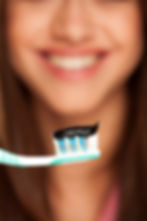Charcoal Toothpaste Good or Bad?
- Dr. Saumitra Saravana
- Jan 25, 2019
- 3 min read
Should you use Charcoal Toothpaste?
Globally about $40 Billion (that is B for Billion!) is spent on Oral Health Care products. Along with the different kinds of toothpastes made for Whiter teeth, Fresher teeth or Sensitive teeth, these days you see different toothpastes that have Charcoal in it. So what do we think about Charcoal Toothpastes?
Charcoal as we all know is made from natural products like wood and when they are processed to become very absorbent, they are called Activated Charcoal. Using charcoal as a tooth cleanser is not a new idea. Many countries in Africa and Asia use Charcoal to clean their teeth. As charcoal has the ability to absorb, they help in control bad breath or halitosis.
Amongst other things, activated charcoal for the treatment of poisoning and overdoses, including ‘internal cleaning’, reducing flatulence and lowering cholesterol levels.
We cannot assume that Charcoal is safe to be used on a long term basis, just because it has some medicinal uses. Also, Charcoal Toothpastes should not be considered to be regular toothpastes to which charcoal has been added.

Normally most toothpastes that have been approved by the American Dental Association have Fluoride in it. As we know, Fluoride is an important agent in keeping our teeth healthy and cavity free. Fluoride might be notably absent in Charcoal toothpastes as it’s possible that the Fluoride might bind to the Charcoal in the toothpaste and thereby reducing its whitening effects.
Charcoal is significantly more abrasive and will lead to higher wear on your teeth. In one study after using toothpastes containing Charcoal for roughly 3 months, they found the teeth to be significantly rougher when compared to regular toothpaste. Because these toothpastes are black, people tend to brush longer or use more force, which may increase the wear on your teeth.
This might be one reason why they recommend using an ultra soft toothbrush with charcoal toothpaste. We have heard from many patients that it is a pain to clean their sinks and mirrors when the use the charcoal toothpaste with an electric brush.
We are not also not sure on how dental restorations in your mouth will react to a daily exposure to Charcoal. It is possible that particles of charcoal may collect in the crevices and defects in your restorations/fillings and stain them. You might end up needing costly replacement of your Crowns or Veneers. On a more serious note, should you ingest small amounts of Charcoal, it might interfere with the absorption of medicines that you take. This is not very likely but is possible.
In conclusion, our view is that we do not know enough about this new material. It has the potential to whiten your teeth but so do many other better known products. There are some potential issues in using it long term and so if you absolutely need to join the fad, then using it sparingly. Perhaps once a week or so making sure you rinse off well and definitely make sure to spit everything out. Use a manual toothbrush to keep your bathroom clean and remember use gentle force!
The ADA still does not recommend these toothpastes and we think you should avoid them if you are prone to getting cavities or take medicines that are critical for your health.
{Surface changes of enamel after brushing with charcoal toothpaste
U I Pertiwi, Y K Eriwati and B Irawan}
.jpg)